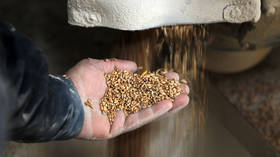Promises made to Russia on Ukraine grain deal were not kept – Türkiye

Russia’s unhappiness with the manner in which the Ukraine grain deal has been implemented is understandable, Turkish Foreign Minister Mevlut Cavusoglu has conceded. The Kremlin has vowed that it will let the accord lapse in mid-May unless the US and EU lift sanctions that effectively prevent Russia from exporting its produce and fertilizers.
In an interview with Türkiye’s Hurriyet newspaper published on Friday, Cavusoglu acknowledged that “what was promised to Russia did not come to pass.”
“We cannot say that the Russians are wrong [with their complaints],” the minister argued.
According to the diplomat, Ankara has notified Washington and London that the future of the deal – formally known as the Black Sea Grain Initiative – is hanging in the balance. Cavusoglu stated that the US and the UK are “two countries [which] are key in banking,” and that the “inclusion of the Russian agricultural bank [Rosselkhozbank] in the SWIFT system also depends [on them].”
The official revealed that UN Secretary-General Antonio Guterres had suggested using a Turkish bank to facilitate payments to Russia for its grain and fertilizer exports.
“The goal is to solve the problem and keep the deal going,” Cavusoglu insisted.
On Monday, Kremlin spokesman Dmitry Peskov told RIA Novosti that Moscow believes the grain deal “can’t be extended without meeting the requirements.”
As per the agreement initially brokered by the UN and Türkiye last July, corridors were established through the Black Sea to ensure safe passage of Ukrainian grain, primarily intended for poorer nations whose food security was threatened.
The deal also required the US and its allies to unblock Russian grain and fertilizer exports, which have remained largely paralyzed due to Western sanctions imposed on shipping, as well as denial of access to brokerage and insurance services.
Formally, however, the US and EU have exempted Russian grain and fertilizers from the sanctions.
In March, Moscow agreed to extend the grain deal by 60 days, warning that it will not do so again if the other parties fail to honor all of its terms.













